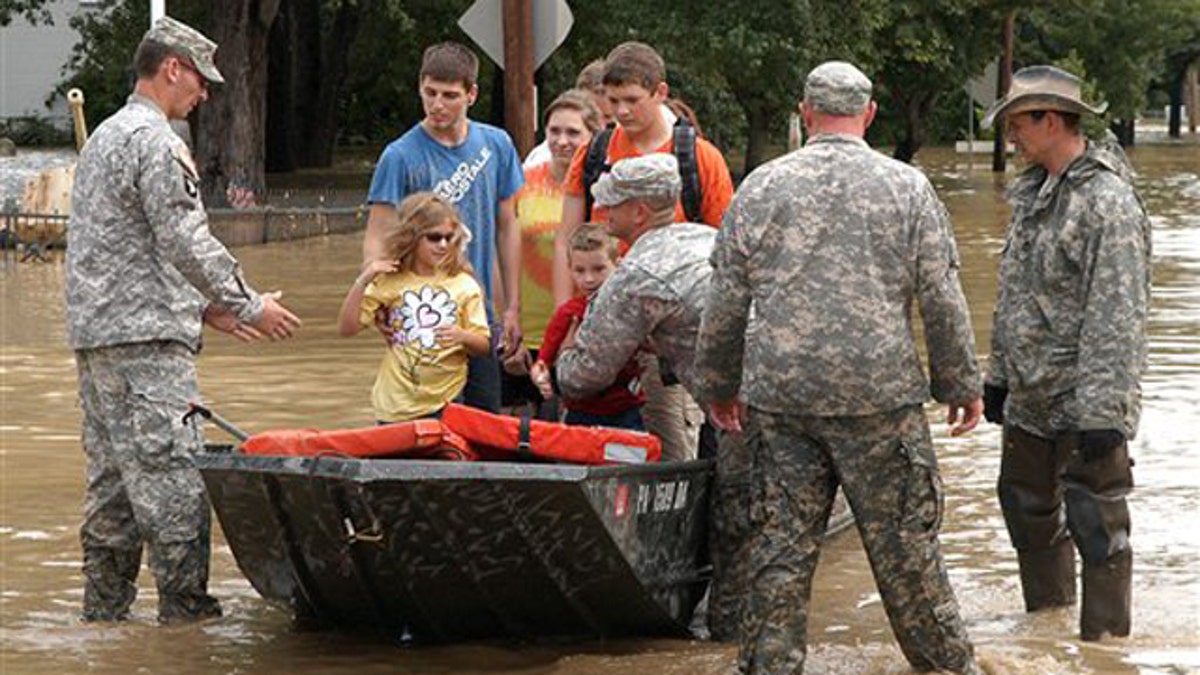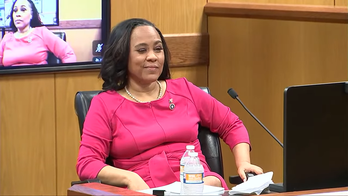
The Army National Guard is shown rescuing residents from their home Sept. 9 in West Pittston, Pa., amid high floodwaters. (AP)
The National Guard is racking up support in Congress for a proposal to give the nearly 400-year-old force a seat on the Joint Chiefs of Staff, a move advocates claim would give the service a much-needed say when critical decisions are made about America's Armed Forces.
Fifty-three senators have so far signed on as sponsors of a bill that would place the chief of the National Guard Bureau on the Joint Chiefs -- making the representative the seventh member of the exclusive and influential military committee.
Backers say a seat on the Joint Chiefs would give the National Guard the ability to better weigh in on funding decisions and provide perspective on the Guard that other members don't have. They say it's all the more crucial now that the Guard has taken on an expanded role overseas fighting in Iraq and Afghanistan.
But Pentagon officials apparently aren't wild about the idea, since the Guard falls under the Army and Air Force -- which already are represented on the Joint Chiefs.
Representatives with the National Guard Association of the United States argue the Guard could play a valuable role at the Joint Chiefs. Under the current set-up, the Guard chief is able to participate in meetings but does not have a vote and is not invited to all meetings.
"It's time," said retired Maj. Gen. Gus Hargett Jr., president of the Guard association. "We don't want to be a separate service. We want to be part of the Air Force and the Army -- with a say in what happens in our services."
Hargett said that at a time of fiscal austerity, the Guard wants to make sure it has a say in potential budget cuts -- and also be at the table to brainstorm ways the Guard could help the rest of the military save money by taking on roles it could perform more efficiently.
Association spokesman John Goheen noted that the Guard has a unique dual role -- deploying troops overseas while responding to emergencies in the homeland.
"The Guard is the military's first responder," he said. "We have some unique roles that need a voice at the table."
Goheen said the other chiefs just don't have the "expertise" on the Guard's role and capabilities. For disasters at home, they are on the front lines -- after Hurricane Katrina, 50,000 Guard troops were sent to the Gulf region. But in the wake of the Sept. 11 terror attacks, members have also served overseas in Iraq and Afghanistan as part of those missions. The Guard consists of 470,000 members, with units under state and federal control.
The Senate bill is close to having a filibuster-proof majority; the House already has passed a similar proposal.
The current members of the Joints Chiefs are the chairman; vice chairman; Army chief of staff; Air Force chief of staff; chief of naval operations; and Marine Corps commandant. The body is tasked with providing military advice to the Pentagon and White House, as well as making funding decisions regarding everything from equipment to training.
Asked about the latest proposal, a spokeswoman at the Pentagon told FoxNews.com that the department would not comment on "pending legislation." Spokesmen with the Army and Air Force likewise had no comment.
But John Kirby, spokesman for Joint Chiefs Chairman Adm. Mike Mullen, said the current chairman and other service chiefs do not support the idea.
"The men and women of the National Guard -- who have performed magnificently during this decade of war -- are appropriately represented on the Joint Chiefs of Staff by the respective Army and Air Force Chiefs of Staff," he said in an email to FoxNews.com. "Since the Chief of the National Guard Bureau was elevated to four-star rank in 2009, the Joint Chiefs have included him in their meetings, and he has contributed valuable perspectives regarding the National Guard -- particularly its critical, non-federalized homeland defense mission and forces."
He said the Army and Air Force chiefs already handle National Guard issues and that adding the Guard seat "would disrupt those lines of authority and introduce representation inconsistencies."
Gen. Martin Dempsey, who is in line to succeed Mullen, also said at a hearing in July that while he's "open-minded" he does have some concerns.
Primarily, he suggested there might be a conflict, with the Army and Air Force already represented on the panel.
"I just don't know what that would do to the relationship if we had now two four-stars overseeing the same force, because we aspire to be one force," he said.
The other concern, he said, was that while the current service chiefs are tasked with handling their budgets, a National Guard representative would not because the Guard chief doesn't control his own budget.
"If we have a National Guard four-star on the Joint Chiefs, he's not accountable because he doesn't have anything with which to deliver capability, and so I'd have to understand how that would be sorted out," Dempsey said.
Making the National Guard part of the Joint Chiefs of Staff was one of the campaign pledges made by President Obama. His transition website included a line arguing that the National Guard should be included "to ensure concerns of our citizen soldiers reach the level they mandate."
The White House did not return a request for comment on the bill before the Senate.
The bill was introduced by Sen. Patrick Leahy, D-Vt., and has since garnered bipartisan support.
A Leahy aide said it doesn't appear likely the Senate Armed Services Committee will act on it as a stand-alone bill, but the proposal could be tacked on as an amendment to a broader defense bill later this year. The proposal would probably still have to clear the House again should it pass.
The Leahy aide said the Pentagon is clearly opposed to the proposal and disputed Dempsey's claims that the Guard chief has no authority over certain budget accounts. As to the claim that such a bill would put two officials on the Joint Chiefs to oversee the Army, the aide said the same argument was made three decades ago when the Marine commandant was given a seat -- since the Marine Corps is part of the Navy.




